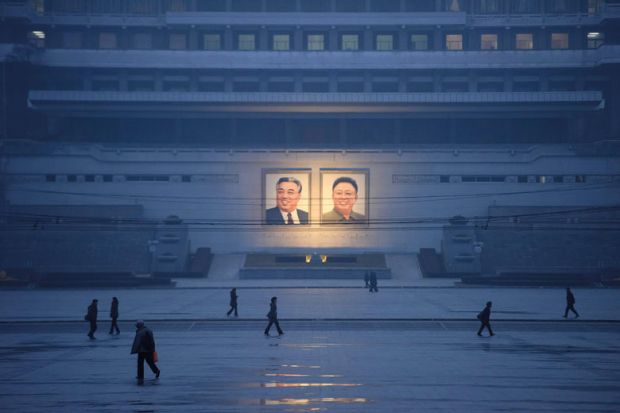An article published this month in The Asia Pacific Journal of Anthropology offers an extremely rare look at social interaction in a country that its former leader Kim Jong Il described as “shrouded in fog”.
The author of “Sojourn in Paradise: The Experiences of Foreign Students in North Korea”, Alek Sigley, is perhaps best known for writing as “the only Australian living in North Korea” before being detained briefly and deported in 2019. He is also writing a memoir about his experiences.
Now a doctoral student at Stanford University, Mr Sigley carried out in-depth interviews with four foreign students who attended Kim Il Sung University while he was a master’s student, from 2018 to 2019.
He told Times Higher Education that, before the pandemic at least, there were about 100 foreign students at Kim Il Sung University and 100 at the Kim Hyong Jik University of Education. The great majority are Chinese.
Mr Sigley argues that, while students are still under state control, they can provide greater insight into North Korea than most visitors, who usually enter on brief, highly restricted tours. Students, who can spend months or years in the country, are “granted opportunities allowing them to experience the country more comprehensively, such as freedom of movement within the city and the chance to live alongside local students and interact extensively with their teachers”.
For this study, he interviewed one Russian, one ethnic Korean Uzbek and two Chinese students who had been sponsored for study by their government. All were studying the Korean language.
At school, they performed what Mr Sigley called ketman, or “public performances of political loyalty”. For example, they knew to say and write things that followed state propaganda and take part in patriotic activities. In one case, the Uzbek student had to suppress his laughter and “keep a poker face” while reading a particularly overwrought passage.
Still, ketman did take its toll. “I wrote so many things that were against my conscience, having to partake in their personality cult,” one student said. The two Chinese students were made to take part in a recital involving weeks of practice so they could dance and intone like North Koreans.
The foreign students lived in dormitories among tongsuksaeng, North Korean students who acted as “hosts”. However, the hosts’ role as informers was an open secret given that they would go through the foreigners’ belongings, ask to see their phones and track their movements.
“It results in the somewhat ludicrous situation where all foreign students know that the tongsuksaeng are spying and writing reports on them, but this is never admitted by the tongsuksaeng and results in disharmony and loss of face if pointed out by the foreign students,” Mr Sigley wrote.
The foreign students did try to reach out, despite restrictions.
For example, they befriended a North Korean who would bring home-cooked snacks and help with Korean homework, engendering “really good feelings towards each other”. However, this local student suddenly said she felt ill and never came back.
“Foreign students often say that the tongsuksaeng who become too close with the foreign students are made to leave early,” Mr Sigley wrote.
When the foreign students left their host a modest gift – a swimsuit, T-shirt and sunscreen – it was returned to them at the airport.
Similarly, when foreign students offered to invite a particularly beloved and elderly professor for a meal before they left, he refused, citing “rules”.
Mr Sigley produced this research in part “to complicate the perceived monolithicity of the North Korean system”.
He told THE that “after I went to North Korea for the first time, I found many of the people I met to be truly lovely human beings. That is something we don’t hear enough about. No doubt they live under an extremely oppressive government, but people are still people at the end of the day.”
Register to continue
Why register?
- Registration is free and only takes a moment
- Once registered, you can read 3 articles a month
- Sign up for our newsletter
Subscribe
Or subscribe for unlimited access to:
- Unlimited access to news, views, insights & reviews
- Digital editions
- Digital access to THE’s university and college rankings analysis
Already registered or a current subscriber? Login







